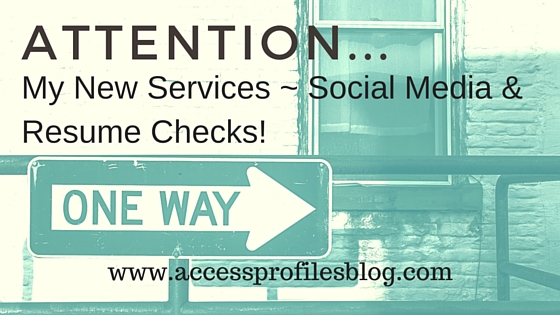
Ready to jumpstart your career? If you are looking for an internship, your first job, or even for that well-deserved promotion, it is best to go in with all bases covered. Knowing what is "out there"about you"and understanding how that can be used as part of an employment Background Check is key.
And if you are a Small Business Owner, understanding how to legally use social media information in screening your applicants is simply good business! Read on.....
How Much of what You Post Online is Really Private? Should You be Concerned what is “Out There” About You? The answer? A Resounding YES!
Despite privacy settings, probably very little of what you post online is truly private. Do you know what your friends or “online acquaintances” are posting or sharing online about you?
A Hot topic is the use of information found on Social Media by Employers both during the Hiring Process and in Dictating Employee Conduct. Questions revolve around how much of what is found can be used to either make employment decisions or be used to contain existing employee’s online behavior.
In the first of this two part series, we will discuss how Social Media posts, pictures, etc. are used during the hiring process.
Many times, checking social media it is not part of the “formal” background check investigation, but is often an added “tool” used by the hiring company or background check investigator for getting a clearer picture of the applicant.
Most employers or their agents run an applicant’s name through Facebook, LinkedIn, Twitter, etc. to see what is “out there”. For this reason, we recommend any job seeker do a Background Check on themselves prior to putting out that first application (read our earlier blog post on this topic).
What most companies do not do, and definitely should not do, is request an applicant’s passwords to access those accounts. Checking to see what is readily available to the public on those platforms is a far cry from asking for passwords to do so. As an employer, it is not wise to attempt to gain this information from anyone.
In fact, in many cities and states it is illegal.
Some states have passed their own laws to prohibit the request of passwords (and we predict many more will follow suit) *Source1. It is a clear invasion of privacy to ever request this type of personal information.
Despite regulations governing the request of social media passwords, applicants and employees still need to be mindful of what they post.
It goes without saying that your sites should be set to private. However, it would still be in your best interests to refrain from posting anything that could seen in a negative or controversial way.  |
| Contact Us Now! We can Help You! |
Social network posts, comments, and pictures by either you or others may reveal information about you that you might not want a potential employer to know.
The truth is, employers often use whatever information they can obtain to help them make a hiring decision. It is important that you know what information can be seen by those not even in “your circle” and to think about what kind of conclusions might be drawn from it.
Nothing Online is Ever Truly Private! "Tweet This"
Your best course of action is to imagine anything you post could possibly be seen by a wide variety of people ~ your family, friends, neighbors, teachers, employers, and even those that are strangers to you. Using that as a guide,
do you still want to share that post? Asking yourself that question BEFORE you share is the wise way to go.
Your posts may also open you up to potential discrimination by employers. You need to evaluate whether you reveal things such as your sexual orientation, political views, or any groups affiliations that could be held against you.
While there are existing laws designed to prevent discrimination based on things such as age, race, gender, and disabilities; the laws are just beginning to address the other issues mentioned above.
It also important to understand that the individuals responsible for screening potential hires are human. Once they see things, they cannot be unseen.
Another thing you need to consider is whether you have shared any negative posts about your current or former employer. Many times this can also have a negative impact on your chances of getting a job offer.
How can using Social Media correctly actually HELP you find a job or get a promotion?
Once you know that your social media posts and profiles will most likely be seen as part of the hiring process, why not use that to your advantage?When setting up your profile, make sure you present yourself in a good light. Highlight your education, professional accomplishments, charity work, and volunteer activities. Creating a page or profile that shows you are an interesting and accomplished individual can help you land that job.
It is not all about bragging or showing off. Employers like well-rounded people. If your posts and profiles reveal a person who likes to be involved, stays active in your community, and is generally interested and interesting, you will stand out beyond your resume.

The key take away here is to be aware. You need to know what your Social Media presence is really saying about you. Is it a picture you want to paint?
Think twice about what you post and remember, it is best to assume that nothing on the internet is ever really private and may be used against you!
Check out Part 2 in this series on what a company needs to do to establish a sound Social Media Policy!

We can Help You Land Your Dream Job or Hire Safely for Your Small Business!

Find out more about the Services we offer and Links to help us Connect! We would love to hear from you!
Source1: New laws in six states ban employers from asking for social media passwords
No comments:
Post a Comment
Thanks for visiting our website. Contact Us! We can answer your questions and offer you a consultation on how we can help You with your Hiring, Business, and Security Needs!
We also invite you to Subscribe. Just leave your email and you will get one new article each month with tips and information focused on You and Your Business!